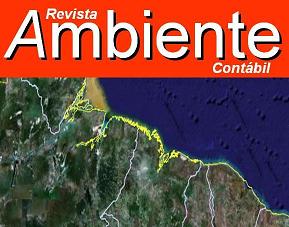UM ESTUDO SOBRE AS PRÁTICAS DE AVALIAÇÃO DE EMPRESAS PELOS CONTADORES CADASTRADOS NA ASSOCIAÇÃO DE PERITOS JUDICIAIS DO ESTADO DE PERNAMBUCO - APJEP
DOI:
https://doi.org/10.21680/2176-9036.2017v9n2ID10025Palavras-chave:
Avaliação de Empresas. Métodos. Contadores.Resumo
O presente estudo teve como objetivo analisar quais os métodos mais comuns utilizados pelos Contadores cadastrados na Associação de Peritos Judiciais do Estado de Pernambuco quando da avaliação de empresas. A pesquisa foi realizada com Contadores associados à APJEP por meio de questionário semiestruturado divididos em duas partes. A primeira parte tratou das características profissionais dos contadores respondentes, já a segunda abordou as propriedades do trabalho contábil do profissional em relação às especificidades na avaliação das empresas. Foram enviados 86 questionários via e-mail, sendo obtidas 5 respostas. Em relação aos seus objetivos, a pesquisa é de caráter exploratório. Quanto aos procedimentos, é predominantemente quantitativo, pois houve tanto quantificações na coleta de informações quanto análises aprofundadas em relação ao fenômeno estudado. Os dados utilizados neste trabalho foram obtidos em uma pesquisa quantitativa, sendo os números dispostos através das percentagens e apresentados para traduzir as informações de forma qualitativa. Para análise de dados deste artigo e tabulações das informações em tabelas, foi utilizada como ferramenta de apoio a Microsoft Office Excel 2007. Os Contadores pesquisados foram em sua maioria homens, metade deles possuem especialização e apenas dois com Mestrado. Foi possível concluir que os Contadores mostram o baixo nível de confiabilidade da informação contábil, e também a dificuldade em estimar valores subjetivos. Constatou-se, ainda, que os métodos de avaliação de empresas mais utilizados pelos profissionais da contabilidade associados à APJEP foram nesta ordem o método baseado no fluxo de Caixa e o Método baseado no Balanço Patrimonial.
Downloads
Referências
ASSAF NETO, Alexandre. Valuation (2014). Métricas de Valor & Avaliação de Empresas. São Paulo: Atlas.
BEUREN, Ilse Maria (Org.) (2004) Como elaborar trabalhos monográficos em contabilidade: teoria e prática. 2. Ed. São Paulo: Atlas.
BRASIL. Lei nº 10.406, de 10 de janeiro de 2002. Institui o Código Civil brasileiro. Diário Oficial da União. Brasília.
CERBASI, G. P. (2003). Metodologias para Determinação do Valor das Empresas: uma aplicação no setor de geração de energia hidrelétrica. 2003, 143f. Dissertação (mestrado em administração) Universidade de São Paulo (USP), São Paulo.
DAMODARAN, A. (2007). Avaliação de empresas. 2 ed. São Paulo: Pearson Prentice Hall.
FALCINI, P. (2009). Avaliação econômica de empresas: técnica e prática. São Paulo: Atlas.
KLETTE, T. J; KORTUM, S. (2004). Innovating firms and aggregate innovation. Journal of Political Economy, Chicago, vol. 112, n. 5, p 986-1018.
LIMA, A. C. CALLADO, A. A. C. (2006). Existem discrepâncias no valor econômico das empresas de energia elétrica comparando os valores de mercado e os valores pelo método do fluxo de caixa descontado. XIII SIMPEP. Bauru.
MARTINEZ, A. L. (1999). Buscando o valor intrínseco de uma empresa: revisão das metodologias para avaliação dos negócios. In: ASSOCIAÇÃO NACIONAL DE PÓSGRADUAÇÃO EM ADMINISTRAÇÃO – ANPAD. Anais. Foz do Iguaçu.
MARTELANC, R., PASIN, R., &PEREIRA, F. (2010). Avaliação de empresas: um guia para fusões & aquisições e private equity. São Paulo: Pearson Prentice Hall.
MARTINS, E. (2001). Avaliação de empresas: da mensuração contábil à econômica. São Paulo: Atlas.
MARTINS, O. S., PAULO, E.,&ALBUQUERQUE, P. H. M. (2013). Negociação com informação privilegiada e retorno das ações na BM&F Bovespa. Revista de Administração de Empresas – RAE, São Paulo vol. 53, p 350-362.
MULLER, A. N; TELO, A. R. (2003). Modelos de avaliação de empresas. Revista FAE, Curitiba, v.6, n.2, p.97-112, maio/dez.
RAUPP, F. M.; BEUREN, I. M. (2003). Metodologia da pesquisa aplicável às ciências sociais. In: BEUREN, Ilse Maria (Org.). Como elaborar trabalhos monográfico sem contabilidade: teoria e prática. São Paulo: Atlas.
RIBAS, R. O. C. (2008). Apuração de haveres – critérios para sociedade empresária do tipo limitada. Dissertação de mestrado em Direito Comercial. PUC-SP.
SANTOS, J. L. dos; SCHIMIDT, P.; FERNANDES, L. A. (2006). Avaliação de Empresas – Foco nos Modelos a Valores de Entrada e de Saída – Teoria e Prática. 1. ed. São Paulo: Atlas.
SILVA, C. A. T.; CUNHA, J. R. da. 92003). Questões para Avaliação de Empresas na Nova Economia. Revista Contexto, v.4, 1º Semestre; UFRGS.
Downloads
Publicado
Como Citar
Edição
Seção
Licença
Autores que publicam nesta revista concordam com os seguintes termos:
Os autores mantêm os direitos autorais e concedem à revista o direito de primeira publicação, com o trabalho simultaneamente licenciado sob a Licença Creative Comomns Attribution que permite o compartilhamento do trabalho com reconhecimento da autoria e publicação inicial nesta revista.
Os autores têm autorização para assumir contratos adicionais separadamente, para distribuição não-exclusiva da versão do trabalho publicada nesta revista (ex.: publicar em repositório institucional ou como capítulo de livro), com reconhecimento de autoria e publicação inicial nesta revista.
Os autores têm permissão e são estimulados a publicar e distribuir seu trabalho online (ex.: em repositórios institucionais ou na sua página pessoal) a qualquer ponto antes ou durante o processo editorial, já que isso pode gerar alterações produtivas, bem como aumentar o impacto e a citação do trabalho publicado.
A Revista Ambiente Contábil utiliza uma licença Creative Commons CC-BY-NC-ND (Atribuição-NãoComercial – SemDerivações 4.0). Isso significa que os artigos podem ser compartilhados e que a Revista Ambiente Contábil não pode revogar estes direitos desde que se respeitem os termos da licença:
Atribuição: Deve-se dar o crédito apropriado, prover um link para a licença e indicar se mudanças foram feitas.
Não Comercial: Não se pode usar o material para fins comerciais.
Sem Derivações: Se for remixar, transformar ou criar a partir do material, não se pode distribuir o material modificado.

Creative Commons - Atribuição-NãoComercial-SemDerivações 4.0 Internacional


 Português (Brasil)
Português (Brasil) English
English Español (España)
Español (España)


